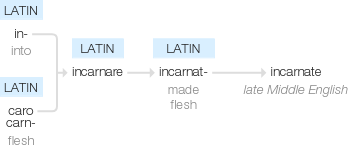Incarnate
late Middle English: from ecclesiastical Latin incarnat- ‘made flesh’, from the verb incarnare, from in- ‘into’ + caro, carn- ‘flesh’.
wiktionary
Borrowed from Ecclesiastical Latin incarnatus, past participle of incarnari(“be made flesh”), from in- + Latin caro(“flesh”).
From the past participle stem of Latin incarnare(“make flesh”), from in- + caro(“flesh”).
in- + carnate
etymonline
incarnate (adj.)
late 14c., "embodied in flesh, in human or bodily form" (of souls, spirits, etc.), from Late Latin incarnatus "made flesh," a frequent word among early Christian writers, past-participle adjective from Latin incarnare "to make flesh" (see incarnation). Of qualities or abstractions, 1530s.
incarnate (v.)
"clothe or embody in flesh," 1530s, a back-formation from incarnation, or else from Late Latin incarnatus "made flesh," past participle of incarnare "to make flesh; be made flesh." Meaning "make or form flesh" (as in healing a wound) is from 1670s. Related: Incarnated; incarnating.
